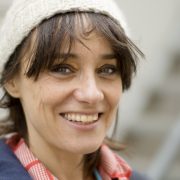Lidija Zelović – A private journey through war
By Fiana Gantheret
Lidija Zelović, a Bosnian journalist and filmmaker from a Serbian/Croatian family, left Sarajevo in 1992 when the war came to her home town. She flew to The Netherlands, leaving behind her brother and parents. They joined her in Amsterdam two years later.
Lidija Zelović has followed the conflicts in former Yugoslavia as a journalist for many years. She lives in Amsterdam, where she teaches filmmaking, writes, produces and directs documentaries (see here). My Own Private War, now in distribution, is an attempt at making “the most truthful and honest movie about the war”.
« And then you loose it. And you wonder : have you lost a part of yourself, as well ? »
An empty Macedonian Mediterranean restaurant in Amsterdam. 11am. Lidija Zelović opens the door for us, and goes behind the counter to prepare coffee. She made this place her office. There is something about expatriates, a way to make a place your own and in turn to be generous with it. In the case of Lidija Zelović, there is also a warm and joyful personality that makes you hug her the first time you meet her. What she reveals of her youth in My Own Private War, the way she felt “invincible”, her self-confidence, her absence of doubt concerning her place in the world, might explain the happiness that emanates from this slender woman. The choice of music in her documentary successfully gives an idea of her point of view on life: ABBA is a cheerful type of music.
This restaurant in Amsterdam is the place where I meet her to talk about her life, her work, her son, her war. Lidija is Bosnian from Serbian/Croatian origin. She was 21 when the war came to Sarajevo, her hometown. Apprenti journalist, she already films everything: people, the fallen autumn leaves on the sidewalk… she has a curiosity for the world that urges her to show it. The world, and all that it contains, good and bad, love and war. In Sarajevo, the words were her weapon. When the war broke out, she left Bosnia. Her father put her in a plane that took her eventually to The Netherlands, after an incredibly complicated journey through Serbia and Croatia. This journey is described in the The Experience, a permanent exhibition at the Humanity House in The Hague. In The Netherlands, she studied filmmaking at the university of Amsterdam. Now in the middle of her life adventure, as she puts it, she tries to make “the most truthful and honest movie about the war”. My Own Private War was made for that purpose: to understand what happened there, in former Yugoslavia, that made her loose her world, a part of herself : « then you loose it. And you wonder : have you lost a part of yourself, as well ? ». How to shape one’s personality in the aftermath of war? Her concern is to disappear into victimhood, and that it becomes her identity. Instead, she captures all the nuances of the experience of war. The truthfulness and honesty she seeks resides in the exhaustiveness of her search. Indeed, Lidija Zelović does not shy away from any aspect of the issue and walks us through legitimate questionings that resonate in today’s world: truth, identity, and sense of belonging.
“You have to belong”
How may Lidija relate to her childhood when her favorite cousin, an important figure in her life, became a sniper in her home town? He picked a side, where he felt he belonged. The need to belong drives people to choose sides, and to assert their identity when feeling provoked. He is marked by his experience. His face shows it, twitching. He wanted to belong, almost as if against his will. He says he never killed civilians.
How do survivors of war act towards the “truth” of what happened, and what is their conception of it? Are they interested in the other side of the story? In the truth of the other survivors? Is it possible to talk about crimes committed by both parties? This is an issue that is familiar to the field of international criminal justice, which Lidija Zelović knows, by force. Without these trials, the world would be madness, she thinks, considering them therefore necessary. However, what is this truth that they pretend to tell in their judgements, and how does it reach the populations affected by the conflict? How does it reach entire families who are struggling with internal discussions concerning their origins, as in the case of her own family? These are complicated issues raised in her documentary, and that she still discusses and reflects upon, like on that day, in Amsterdam, with me.
Similarly, what happened in villages where Muslims and non-Muslims lived in harmony for half-century and then became enemies in the course of five days? Families dig in their ascendance to find their identity, their origins. Last names give away your belonging, and young men were taken away on this basis. Nothing the neighbors could have done about it. Lidija Zelović questions her close family about this period, as well as about their Serbian origin. Each side has their own truth, no less valid than the other one’s. She travels after the wars ended to Kalinovik, where Ratko Mladić, Serb commander, was born. She meets there Snježan, an old friend of hers who is also from a mix family, and a journalist, like her. If asked, he says he belongs to the Serbian group. He followed Ratko Mladić during the war. Lidija suggests the idea of a movie, made together, where both stories could be confronted: the story where Mladic is innocent of the crimes in Srebrenica, and the story in which he should be tried. He refuses: “why would I hear someone else’s version of the truth?”.
And so through resistance from friends and family, Lidija set on this journey to make the most truthful and honest movie about the war. Her truth is to understand what happened. A position that her father envies: defending the victims, without choosing sides. According to Lidija Zelović, if you put your camera down, you are not objective. She went back to Sarajevo after the war, to see it, but through the camera’s lense. A sort of a protection, as well.
Her next movie, Home abroad, will address the issue of being an immigrant: “a permanent temporary feeling, like a holiday that got out of hands”. Another part of her life, another journey.

